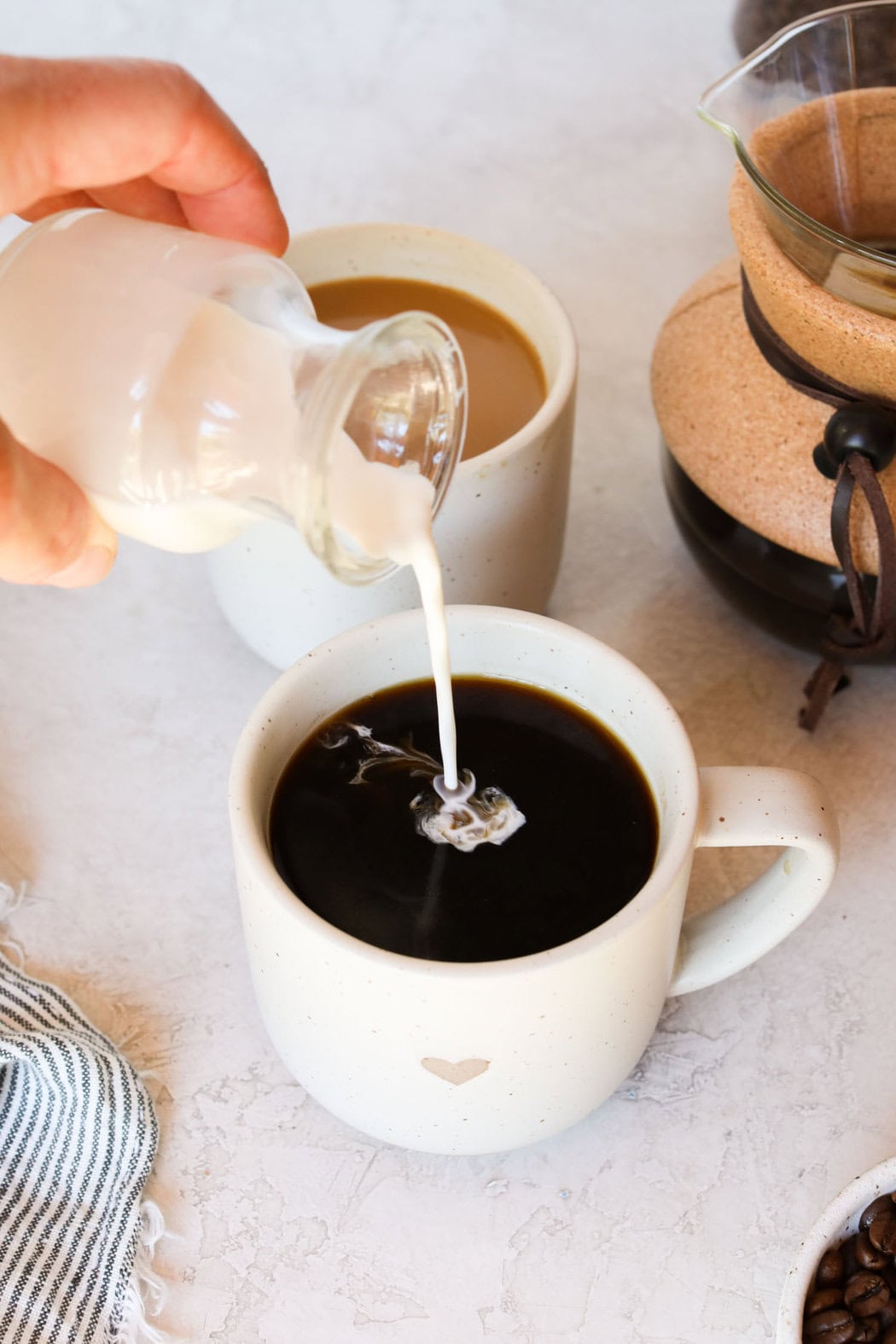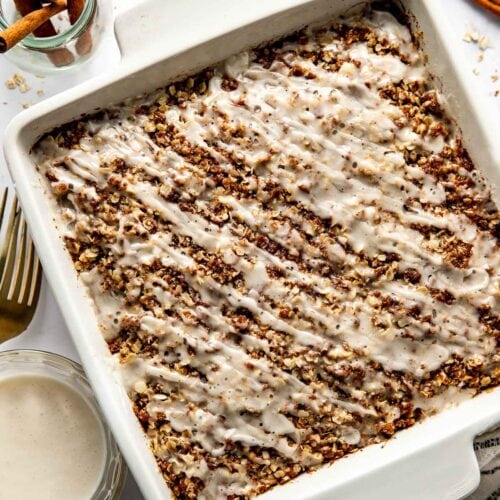I drink coffee almost every day of my life, and so do my registered dietitian colleagues. So it was of interest to me—and to so many of you—as to whether or not drinking coffee presents any health risks. I took a deep dive into the research to share what scientists have uncovered about coffee and if there are any risks of consumption.
I was happy to learn that, for most people, drinking coffee (as long as it’s not too much) is not harmful and even provides benefits. A meta-analysis of more than 200 studies on coffee and human health stated that there is no consistent evidence of harmful associations between coffee consumption and health outcomes for nearly all populations.
So if you’re wondering how much coffee is too much, the answer is more than 4 cups or more than 400 mg of caffeine. I share more about that in the Everyday Consumption section below.

The Potential Benefits
Let’s start out on the positive side of caffeine and coffee. Coffee has some nutrients that are beneficial to health, and research has been done to see the beneficial impacts on coffee drinkers (present and in the long-term).
While this is not an exhaustive list, these are some of the most well-researched benefits of coffee and reasons to enjoy that morning cup:
1. Reduced Risk Of Chronic Diseases
Approximately 1,000 antioxidant compounds have been identified in unroasted green coffee beans. Then, several more antioxidant compounds form during the roasting process, making coffee an incredibly rich source of antioxidants, flavonoids, and phenolic acids. When consumed often, coffee may help lower risk of inflammatory and chronic diseases, such as:
- type 2 diabetes
- liver disease and liver cancer
- colorectal cancer
- Parkinson’s disease
- Alzheimer’s disease
2. Brain and Metabolism Boost
Coffee temporarily boosts brain function, increases vigilance, and improves mood in most drinkers. And significant research has linked coffee drinking to a decreased risk of depression in a systematic review.
Additionally, coffee has also been shown to improve athletic performance and provide a modest boost in metabolism.
3. Contains Nutrients
Though in small amounts, each cup of coffee contains B vitamins, including riboflavin, pantothenic acid, thiamin, and niacin, as well as some key minerals, including potassium, magnesium, manganese, and phosphorous. If you drink a few cups each day like I do, those amounts may start to add up and contribute positively to your overall nutrient status.
4. Provides Comfort And Joy
If you’ve ever experienced a truly great cup of coffee – or even a “just OK” cup of coffee shared with good company – then you know what I mean. With flavor notes that can vary from fruity to chocolatey to earthy to spicy or even floral, the tastes and aromas of coffee are complex, comforting, and so enjoyable for those who partake in it.
As noted above, there’s also significant research studies showing that coffee has protective value against depression. Personally, that first cup of coffee I drink after waking up brings a lot of comfort to my mornings especially when paired with a warm cinnamon raisin biscuit.

Caffeinated Versus Decaffeinated
There’s no doubt about it that caffeine affects humans in different ways. But the good news is that decaffeinated coffee exists for people who enjoy drinking coffee but don’t want the caffeine. Caffeine can be removed from coffee beans with three methods: chemical solvents, liquid carbon dioxide (CO₂), or plain water with special filters.
Whether you choose one over the other should be determined by what you want from coffee. If you want the stimulation and mood benefits, then you’ll most likely want to choose coffee with some caffeine content. But if it’s just the antioxidant benefits you seek, the good news is that both caffeinated and decaf coffee have similar antioxidant properties. If you are highly sensitive to caffeine or fall into a category that should limit it—but you still love the taste of coffee—then opt for decaf.
The Possible Downsides
Some people are especially sensitive to caffeine in coffee. And there are some downsides that every coffee drinker should pay attention to.
1. Disrupted Sleep
Because of the caffeine that coffee contains, people who are sensitive to it may experience disrupted sleep, especially if they drink coffee within 6 to 8 hours before bedtime. The effects of caffeine can last in the human body for up to 12 hours after consumption. Excessive caffeine consumption (which, by the way, is more than 400 milligrams of caffeine or 4 cups of coffee for most adults on a daily basis) can cause insomnia, jitteriness, anxiety, heart palpitations, and even exacerbations of panic attacks.
2. Headaches And Withdrawal Symptoms
For some people, the caffeine in coffee can contribute to high blood pressure, headaches, or migraines. People who drink coffee (or caffeine-containing drinks) on a regular basis develop a tolerance, so long-term effects on blood pressure are minimal.
On the other hand, even more people get headaches when they don’t drink coffee. That’s because caffeine narrows the blood vessels around the brain. If your body becomes accustomed to drinking coffee daily, you can experience caffeine withdrawal and can develop a headache when the blood vessels expand in the absence of caffeine.
3. Mold And Contaminants
Is mold in coffee really a thing? It turns out it IS! Mold can enter coffee anywhere in the production cycle, from growing and harvesting to processing, transport, and storage. Coffee beans are typically grown in hot and humid regions, which is ideal for mold growth. Mold can also occur when the beans are stored, especially if they’re not completely dry, and also once the beans are ground or brewed. If you’ve ever accidentally left brewed coffee beans in your coffee maker for a few days, you may even have seen mold growing on them (this happened to me once when I brewed a carafe of coffee and forgot to clean out the coffee filter before I left for vacation).
Why Is Mold In Coffee A Bad Thing?
Mold is undesirable in coffee because where there is mold, there can be mycotoxins. Mold and mycotoxins are a serious health concern, with side effects ranging from acute poisoning to long-term effects, such as immune deficiency, cancer, or even death. If mycotoxins are present in your daily coffee beans, only a small amount of them can be eliminated at high roast temperatures.
Unfortunately, these high temperatures may increase the formation of carcinogenic polycyclic aromatic hydrocarbons, while also eliminating healthy chlorogenic acids (those antioxidants I referenced above) in coffee. As a result, you want to find coffee that’s tested for mold as it passes through each step of the supply chain, ensuring it is free from contamination.

Who Should Avoid Coffee?
While it is safe for nearly all healthy adults to drink coffee, there are a few exceptions in certain population groups. People who should reduce or avoid coffee are those who are pregnancy, women at high risk of bone fracture, people with severe hypertension, and kids.
1. Pregnant Or Breastfeeding
I first want to state that I drank coffee through all three of my pregnancies, and I had three healthy, normal-weight babies. I experienced a lot of headaches during pregnancy, and my OBGYN let me know that my normal coffee consumption, which was one to two cups during pregnancy, was just fine. However, pregnant women should know that consistent high intakes of coffee (or any drink with caffeine) does put you at higher risk of preterm labor and low birth weights. The American College of Obstetricians and Gynecologists recommends that pregnant women limit caffeine consumption to less than 200 milligrams per day, which is about two 6-ounce cups of coffee or one strong-brewed scant 12-ounce cup.
Some breastfeeding women choose to limit or abstain from drinking coffee, as well, for fear that caffeine can pass on to the baby through breastmilk. But this doesn’t need to be a big concern, since only 1 to 1.5% of the caffeine that the mother drinks actually passes on to the baby.
2. Women At High Risk Of Fracture
There is inconsistency in the association between coffee consumption and musculoskeletal risk (pain or fracture that affects bones, joints, ligaments, skeletal muscles or tendons). Studies show no significant associations between any amount of coffee consumption and the risk of any musculoskeletal pain or fracture. However, in a subgroup analysis by gender, high coffee consumption was associated with an increased risk of fracture in women, but not men. The analysis shows that women who are already at risk of bone fracture (that includes women who smoke or drink alcohol consistently, have significant weight loss, a family history of fracture, low physical activity, or low calcium or vitamin D intake) increase their risk of fracture by 3.5% for every additional cup of coffee they drink daily.
3. People With Severe Hypertension
When it comes to blood pressure and drinking coffee, two things matter: how bad the hypertension is, and how much coffee you drink. A 2022 study published in the Journal of The American Heart Association, indicates that it would be prudent for people with severe hypertension to limit coffee intake to 1 cup per day or less. In this study, the researchers used five categories to classify blood pressure levels:
- optimal and normal (less than 130/85)
- high normal (130-139/85-89)
- grade 1 hypertension (140-159/90-99)
- grade 2 (160-179/100-109)
- grade 3 (180/110 or higher).
People whose blood pressure fell into grade 2 or grade 3 (160/100 or higher) were considered to have severe hypertension.
The analysis found that participants in that severe hypertension category who drank two or more cups of coffee each day doubled their risk of dying from cardiovascular disease, compared to those who didn’t drink coffee. Drinking just one cup of coffee – regardless of blood pressure level – did not raise the risk.
It should be noted that, while research shows coffee has an effect on blood pressure, which can be either beneficial or detrimental, depending on how high or low someone’s blood pressure is, there is inconclusive evidence as to the effects of coffee on cholesterol and heart disease. The one caveat here is unfiltered coffee, such as that brewed in a French press, espresso machine, or moka pot with the absence of a filter. This type of coffee allows oils and fine particles to remain in the coffee, which can have a negative effect on cholesterol, raising total cholesterol, LDL cholesterol, and triglycerides. On the matter of cholesterol, coffee doesn’t have nearly the negative effects as another caffeinated beverage–energy drinks–does.
4. Kids
It may go without saying that kids and adolescents should avoid drinks with caffeine, especially energy drinks. While coffee consumption has been blamed for stunted growth and development in kids, it is an indirect association. The main negative effect of children consuming caffeine is disruptions to their sleep cycle, which indirectly has an effect on weight gain, brain development, and growth. And, just in case you were wondering, coffee for kids does exist, though the product is nearly caffeine free.
Everyday Consumption: How Much Is Too Much
A safe amount of coffee for most healthy adults to drink without experiencing negative side effects is 400 milligrams of caffeine intake (the amount in about 32 ounces or 4 cups of coffee) or less. If you are sensitive to caffeine, pregnant, or a woman at high risk of bone fracture, limit intake to 2 cups a day or less—or consider abstaining.
The Bottom Line
After digging through the research on coffee and health, I personally feel good about my daily coffee consumption, which is an average of two cups per day. At this amount, I know that I’m gaining the antioxidant protective factor against certain health conditions (like a lowered risk of type 2 diabetes), getting the stimulation and mood boost that I seek from it, and also experiencing a moment of quiet zen before my day really gets going.
But whether or not YOU choose to drink coffee and how much should depend on any current health conditions you may have, including hypertension and disturbed sleep, if you really enjoy it, and if you feel confident about the quality of the coffee in your cup.

Frequently Asked Questions
Many experts believe that drinking water or having some food in your stomach before drinking coffee has benefits, ranging from improved taste of the coffee and improved hydration to reduced caffeine crashes later and better blood sugar control. However, there is little scientific evidence that drinking coffee on an empty stomach causes any long-term harm.
Coffee contains acids that boost levels of the hormone gastrin. This hormone stimulates wave-like muscle contractions in your stomach that can get your bowels moving and cause you to poop.
Also, if you have a pretty regular digestive system and drink coffee every day, you may associate drinking coffee with going to the bathroom. But in reality, it’s just your body having a consistent pattern, which is similar – but unrelated – to your consistent pattern of drinking coffee.
Coffee is an acidic fluid, which can take a toll on tooth enamel over time. It also contains tannins, which can stain teeth. To minimize the effect of caffeine, it’s a good idea to drink water after you drink coffee, which helps neutralize mouth acids. You could also get in the habit of brushing your teeth when you’re done drinking coffee to reduce any negative impacts on your teeth. A remineralizing tooth powder can help restore enamel.
Setting aside the fact that creamer and/or sweetener added to coffee adds calories to the drink, those additives do reduce the antioxidant content of the coffee slightly. So it’s true that you will get more antioxidants if you just drink black coffee. However, if you add some creamer or make a protein coffee, like I do, most research indicates that I’m still getting a significant amount of antioxidants from the coffee itself, even with creamer added.
Drinking more than 4 cups of coffee per day has been associated with increased dehydration, but moderate consumption has not. The caffeine in coffee is a diuretic, meaning it stimulates urination, but that is usually balanced by the fluid that coffee provides. Again, it’s best to stick to 4 cups or less and to also drink water throughout the day.
Yes, many people who do Intermittent Fasting opt to drink black coffee during the fasting hours. That’s because a main goal of Intermittent Fasting is to reduce the insulin response to foods in order to decrease inflammation over time, tap into fat-burning mechanisms, and boost energy levels. Carbohydrates and protein both stimulate insulin. Therefore, you would want to avoid coffee additives that contain carbohydrates or protein (including protein powder or collagen) during the fasting period.
For ultimate success, we highly recommend reading the tips in the full blog post above. All photos and content are copyright protected. Please do not use our photos without prior written permission. If you wish to republish a recipe, please rewrite the recipe in your own unique words. Link back to the source recipe here on The Real Food Dietitians. Thank you!






